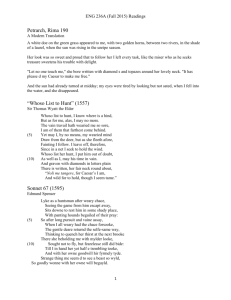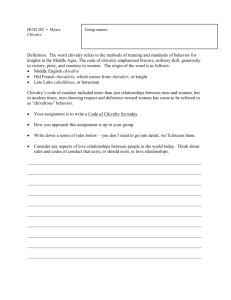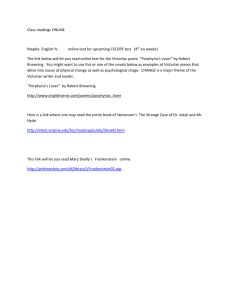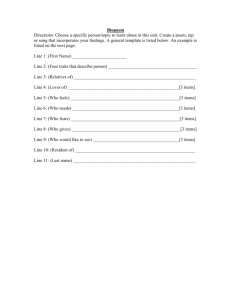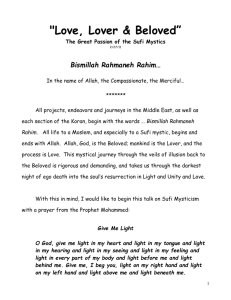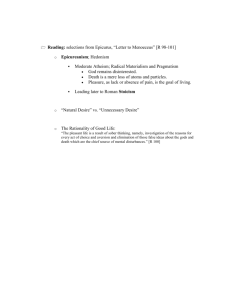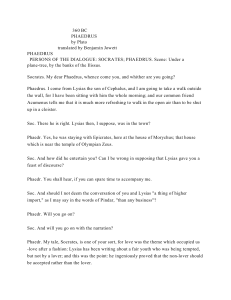Document
advertisement
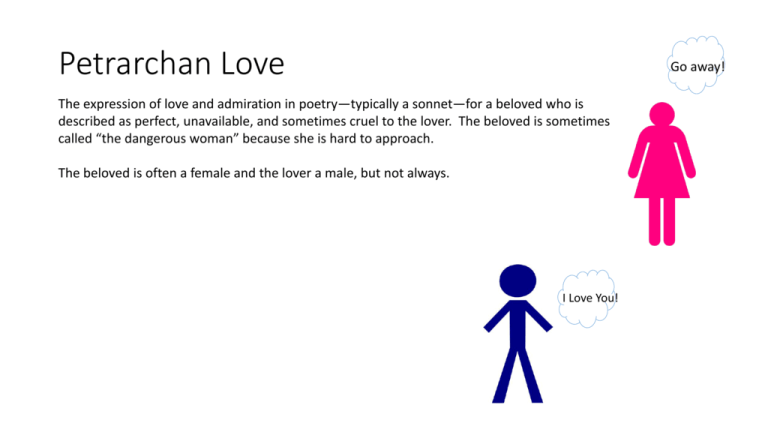
Petrarchan Love Go away! The expression of love and admiration in poetry—typically a sonnet—for a beloved who is described as perfect, unavailable, and sometimes cruel to the lover. The beloved is sometimes called “the dangerous woman” because she is hard to approach. The beloved is often a female and the lover a male, but not always. I Love You! What’s Love Got To Do With It? • Refinement and grace But it is only when they get into the presence that he fully understands how it rattles the old duke to be in a room with Henry Tudor. The gilded ebullience makes him shrink inside his clothers. Henry greets them cordially. He says it is a wonderful day and pretty much a wonderful world. He spins around the room, arms wide, reciting some verses of his own composition. Wolf Hall, 194 She that me learneth to love and suffer And will that my trust and lust's negligence Be reined by reason, shame, and reverence --Wyatt, “The Long Love” With Petrarch to compare there may no wight, Nor yet attain to so high a style, But yet I wot full well where is a file To frame a learned man to praise aright. --“That Petrarch Cannot Be Passsed, but Notwithstanding That Laura is Far Surpassed” What’s Love Got To Do With It? • Desire and ambition: Literal connections between desire and ambition Eight anterooms: in the last, where the cardinal should be, he finds Anne Boleyn. The queen was elsewhere, and Anne sat where Katherine should sit. --Wolf Hall, 184 There’s no point backing off: do that and Henry will chase you down. Advance, and he may just falter. “Howard said you were a common soldier” “That too.” “Anything else?” “What would Your Majesty like me to be?” --Wolf Hall, 168, 169 What’s Love Got To Do With It? • Desire and ambition: figurative connections between desire and ambition Whoso list to hunt, I know where is an hind, But as for me, alas, I may no more. The vain travail hath wearied me so sore, I am of them that farthest cometh behind. Yet may I by no means my wearied mind Draw from the deer, but as she fleeth afore Fainting I follow. --Wyatt, “Whoso List to Hunt” In court to serve, decked with fresh array, Of sugared meats filling sweet repast, The life in banquets and sundry kinds of play, Amid the press of worldly looks to waste, Hath with it joined oft times such bitter taste That who so joys such kind of life to hold In prison joys, fettered with chains of gold. --Wyatt, “The Courtier’s Life” What’s Love Got To Do With It? • Inconstancy: rising and falling at court They flee from me that sometime did me seek With naked foot, stalking in my chamber. I have seen them gentle, tame, and meek, That now are wild and do not remember That sometime they put themselves in danger To take bread at my hand; and now they range, Busily seeking with a continual change. --Wyatt, “They Flee from Me” “The king likes me.” “The king is an inconstant lover.” --Wolf Hall, 180 “Can a general organize a retreat when he doesn’t know where the enemy is? The king is so double in this matter.” “One could retreat straight into his arms” “Jesus. You think our master is double too.” “Triple at least,” Rafe says. “Look, there was no profit for him, ever, in deserting the old man—what would he get but the name of deserter. Perhaps something is to be got by sticking fast. For all of us.” --Wolf Hall, 197-98 What’s Love Got To Do With It? • Inconstancy: death The pleasant years that seem, so swift that run The merry days to end, so fast that fleet, The joyful nights, of which day dawneth soon. The happy hours, which more do miss than meet, Do all consume, as snow against the sun, And death makes end of all that life begun. --”Comparison of Life and Death” <<Bad poem <<Good poem A rain of tears, a cloud of dark disdain Have done the wearied cords great hinderance, Wreathed with error and with ignorance The stars be hid that lead me to this pain, Drowned is the reason that should be my comfort, And I remain despairing of the port. --”The Lover Compareth His State to a Ship in Perilous Storm Tossed on the Sea” But he’s still going to die “I’m Not Waiting on a Lady” Did you not sue and long me serve Ere I you granted grace? And will you thus now from me swerve That never did trespass? Alas poor woman, then alas, A weary life here must I pass. --”The Lady Forsaken of [by] Her Lover.” • “I’m just waiting on a friend” • Gender substitutions: Henry, Anne, Katherine, Wolsey, Cromwell • Mimetic rivalry and desire: “Whoso list to hunt” • Male bonding: “For good is the life ending faithfully” Petrarchan Love Go away! I Love You!
